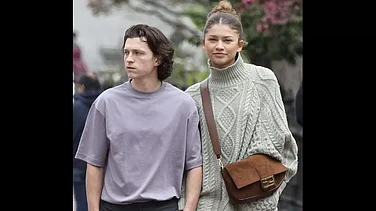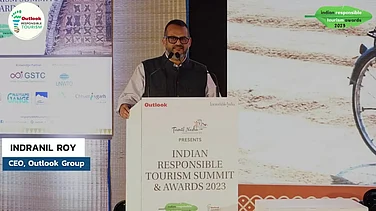What made you turn to bartending from being a banker??
Women In F&B: A Chat With Kasturi Banerjee of Stilldistilling Spirits
Kasturi Banerjee was a banker for almost 18 years, and started bartending in 2019 after a 6-month bartending course. Now she runs Stilldistilling Spirits and has brought out India's first golden rum

Well, I quit my job in 2018. The other thing which I did, apart from working in a bank was staying in Bombay - you really go out a lot to eat and drink! And that is the next thing that really interested me – hospitality and food and beverage. I am not much of a cook, but I make good drinks, so I thought I should hone my talent for making better drinks. And that's how bartending happened.?
What steps led to getting involved with the spirit world?
Just traveling. I got a lot of exposure from a very young age, and alcohol was never considered taboo while we were growing up. I think it was never what made me get into alcohol, but it was more like… it was just another interesting profession, maybe?
How did Stilldistilling Spirits happen? Could you share how your journey was?
While I was doing my bartending course, I was also doing my tasting sessions and some events…I figured out that we wanted to make good quality rum, which is how Stilldistilling was formed. The name was coined because I feel there's never a perfect drink, it is a continuous effort towards perfection, so 'still distilling' is a continuous process of improvement.?
What made you take up rum??
If you see the way we are geographically placed, if you see the whole latitudinal stretch… countries in the Caribbean make fabulous quality rum because sugarcane is grown there, and if you come down to South East of Asia, you will find a similar story. India belongs to the same kind of geographic location and has a similar kind of temperature and climatic conditions. But there’s a huge demand for brown spirits in India because it is a predominantly brown-spirit consumption country. Plus there was enough, and good quality, sugarcane grown here. So I was just trying to match the demand with the supply. Rum is a very versatile drink and needs no new introduction, it just needs a re-introduction.?
What is behind the name?
'Maka Zai’ has a beautiful Indianness to it, but also has a very international appeal. Firstly, it is a rum from India that is made in Goa. And ‘maka zai’ in Konkani means ‘I want’. We have been asked many times if we were a Japanese brand and stuff like that. So, you know it kind of worked out well. We wanted people to have good quality rum.?
How did you decide on releasing these two varieties of the rum??
We started about one-and-a-half years ago, and with a gold and a white because it captures a variety of audiences. Younger, entry-level drinkers think that white spirits are easy to consume and mature audiences like brown spirits. Also, matured liquids kind of lend a bit of layer and pique interest in drinkers. I wanted that complexity in one drink. There’s a lot of thought really, it is not a one-line answer, but the primary reason is to capture a wider range of audiences for sure.?
How does one have the Maka Zai rum?
Maka Zai white rum, which is also called the Bartender's Edition, is a perfect base for a cocktail. While it has its own sweetness and herbaceousness, it renders a beautiful smoothness to any cocktail. So, the Maka Zai White is definitely a cocktail-forward rum. The Tribute Edition, which is the gold rum, is a matured product. It is matured in oak casks for two-and-a-half years – that lends a bit of complexity to the product. You'll get a hint of dry fruits, you’ll get a bit of woodiness from the cask and beautiful finish. It’s a sipping rum, we actually tell people not to mix anything, but if you want to, then just add a cube of ice or a tad bit of water. It is a beautiful sipping rum and should be enjoyed just by itself.?
Why did you base your operation out of Goa??
Few reasons - number one is that Goa has some pre-existing facilities which kind of helps you in establishing a product. We are new business houses, we are start-ups– there are existing distilleries which we can rent out or lease out and use their facility. Secondly, the taxes and the regulations in the state are slightly more friendly towards alcohol and food beverage companies.?
What kind of responses did you get from the people in Goa, and from across India and abroad?
We had initially only thought we would be in Goa, and slowly chose the other markets. One year and three months down the line, we are already in three major markets, i.e. Goa, Maharashtra, and Karnataka– so that itself tells you that we were well accepted, and the demand was so high, the response was so good that we pushed ourselves and went and launched ahead in two new cities, two big markets actually. I mean, every day we get something from happy customers, and if you go out and meet people then you find more and more stories. I recall one of the latest Instagram messages I was replying to. Somebody posted about Maka Zai in Delhi, and whenever a post like that comes, apart from Goa and the two other states, we usually get 10-15 DMs, saying “When will it be available in Delhi?”… and things like that.?
What is the story behind the visual on the bottle of a turtle??
So, the turtle is the Olive Ridley turtle. These are the turtles that are found on very few beaches in India, they only come to Odisha and Goa– primarily, on four beaches. These turtles have a uniqueness in them, wherever they are born, wherever their eggs are laid, those turtles who were born in the same shore, keep coming back to the same shore throughout their lifetime. So, they travel in the ocean for about 9,000 km and come back to the same shore every year. The whole journey is so focused, perilous, and resilient – that is kind of our journey. We relate to it, and we make the rum in Goa - so it was just a very organic collaboration.??
Could you tell us about what it has been like to be a woman in a predominantly male-run sphere??
I will not say this is a predominantly male-dominant industry, I think every industry is predominantly male-dominated. Because I was a banker for 18 years, the same story is in the financial sector too, there are predominantly men everywhere. So, I will not say that it is wholly true because if you know about the F&B industry, primarily the bar and beverage sector, there’s a lady called Shatbhi Basu, who was one of the first bartenders to pass out of IHM in 1984. It’s not that women weren’t a part of this industry. It is just that now it’s being talked about more and there’s more acceptability I would say, and thanks to social media because of which there’s a little bit of more focus and prominence.?
Advertisement
What are the challenges you have faced? How did you overcome them??
Firstly, there’s the challenge of being a start-up. There are challenges in every step, you know of the challenges and that’s why you are in it. The challenges are fine, every business, whichever field you get into, there will be challenges. They make you stronger, they teach you new things and we just overcome them with our own learnings. Every situation is very unique for everyone. When we reach the situation, we learn from that, honestly. There are some mentors and peers whom we can seek advice from. There’s no textbook for this.?
Advertisement
How was your journey during the pandemic?
If you realise, rewind back to one and a half years ago, the only place where people were coming was Goa, if you remember– December, January, you know all through. And we were only available in Goa, which answers the rest of the question, right? So, you know, we had a great time honestly, business-wise, I must say. We are a new brand having an absolute genuine story, a very small team who are always out there, at our bar takeovers, or any tasting, or any masterclass that is usually done by our brand ambassador Abhirup Bhattacharya or me… so you know just by being there on the ground, connecting to the local community… The lockdown, for us, was beneficial in some ways, as a small brand– it was easy for us to understand and grow at a certain pace, though we were at a fantastic steady momentum of growth, the pandemic kind of helped us in various ways, I must say, in Goa.?There were a lot of initiatives with supermarkets and the local bartending community. Apart from the business and sales, we did a lot of community building. We gave bartenders a two-week course on mobile phone photography, we took some initiatives for World Environment Day, we did a Rum Day conversation on Zoom, and we did a couple of online rum-tastings. I think the lockdown really made us very creative in finding new ways to reach out to people. It was a learning experience.
Advertisement
-
Previous Story
 Tom Holland Recalls ‘Trip Of A Lifetime' Visiting India With Girlfriend Zendaya
Tom Holland Recalls ‘Trip Of A Lifetime' Visiting India With Girlfriend Zendaya - Next Story


















